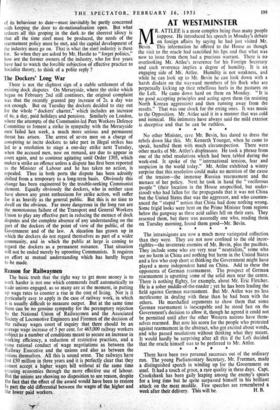Reason for Railwaymen
The basic truth that the right way to get more money is to work harder is not one which commends itself automatically to trade unions engaged, as so many are at the moment, in putting up wage rates to counter a rise in the cost of living. Nor is it particularly easy to apply in the case of railway work, in which it is usually difficult to measure output. But at the same time there can be no genuine sympathy for the peremptory rejection by the National Union of Railwaymen and the Associated Society of Locomotive Engineers and Firemen of the decision of the railway wages court of inquiry that there should be an a‘erage wage increase of 5 per cent. for 465,000 railway workers subject to a number of conditions meant to secure an increase in working efficiency, a reduction of restrictive practices, and a more rational conduct of wage negotiations as between the Railway Executive and the unions and also as between the unions themselves. All this is sound sense. The railways have lost £50 million in three years and it is perfectly clear that they cannot accept a higher wages bill without at the same time s:curing economies through the more effective use of labour. But the unions are showing no disposition to see reason, despite the fact that the effect of the award would have been to restore In part the old differential between the wages of the _higher and the lower paid workers.


































 Previous page
Previous page